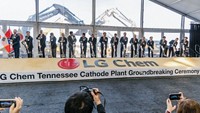Advertisement
Grab your lab coat. Let's get started
Welcome!
Welcome!
Create an account below to get 6 C&EN articles per month, receive newsletters and more - all free.
It seems this is your first time logging in online. Please enter the following information to continue.
As an ACS member you automatically get access to this site. All we need is few more details to create your reading experience.
Not you? Sign in with a different account.
Not you? Sign in with a different account.
ERROR 1
ERROR 1
ERROR 2
ERROR 2
ERROR 2
ERROR 2
ERROR 2
Password and Confirm password must match.
If you have an ACS member number, please enter it here so we can link this account to your membership. (optional)
ERROR 2
ACS values your privacy. By submitting your information, you are gaining access to C&EN and subscribing to our weekly newsletter. We use the information you provide to make your reading experience better, and we will never sell your data to third party members.
Energy Storage
Ford strikes major lithium supply agreements
Albemarle, SQM, and several smaller producers will provide battery raw material that qualifies for US tax credits
by Matt Blois
May 24, 2023
| A version of this story appeared in
Volume 101, Issue 17

Ford Motor has signed lithium supply agreements with multiple producers in Australia and the Americas. Its goal is to bolster access to battery raw materials made outside of China and ensure its vehicles qualify for tax credits in the Inflation Reduction Act (IRA), a US law incentivizing domestic production of materials for electric vehicle batteries and other clean technologies.
The car company has struck deals with the major lithium producers Albemarle and SQM as well as the less-established players Nemaska Lithium, Compass Minerals, and EnergySource Minerals.
Albemarle has agreed to supply Ford with more than 100,000 metric tons (t) of lithium hydroxide between 2026 and 2030 and will work with the automaker on battery recycling. SQM will sell both lithium hydroxide and lithium carbonate to Ford, though the companies didn’t specify how much.
Both Albemarle and SQM, which operate in the Americas and Australia, say their materials will allow Ford to benefit from tax credits in the IRA, which requires that the raw materials for car batteries come from the US or a country that has a free trade agreement with the US.
In March, Albemarle announced plans for a $1.3 billion lithium refinery in South Carolina that is expected to produce 50,000 t of lithium hydroxide per year when it opens in 2027 and may be expanded to 100,000 t. In May, the company finalized plans to double the capacity of a lithium hydroxide facility it’s building in Australia.
Robert Baylis, principal at the battery materials consultancy Carding Mill, says Ford’s decision to work with experienced producers like Albemarle and SQM provides some security that it will receive the contracted chemicals. “You can kick the tires on the assets that are operating today,” he says.
But Ford also announced deals with several new lithium mining projects. The company plans to buy up to 13,000 t of lithium hydroxide per year from Nemaska Lithium, a firm co-owned by Livent and the economic development agency of Québec that is building a lithium mine and processing facility in Canada. In May, Livent announced plans to merge with Allkem, which is developing a separate Canadian lithium mine that may feed into Nemaska’s processing facility.
To cap off its flurry of announcements, Ford says it hopes to source lithium chemicals from Compass Minerals and EnergySource Minerals, less-established lithium producers that are developing projects in the US. Both companies plan to use direct lithium extraction, a technology that chemically removes lithium from brine.
Ford’s agreements secure enough lithium to make millions of batteries that qualify for US tax credits. But to meet its electric vehicle production goals, Baylis says, the company will need to secure other IRA-compliant materials, such as the graphite used to make anodes, which is currently processed primarily in China.
“There’s still a basket of other [materials] that are problematic,” he says. “You can’t make three quarters of a car. You’ve got to make the whole car.”



Join the conversation
Contact the reporter
Submit a Letter to the Editor for publication
Engage with us on Twitter